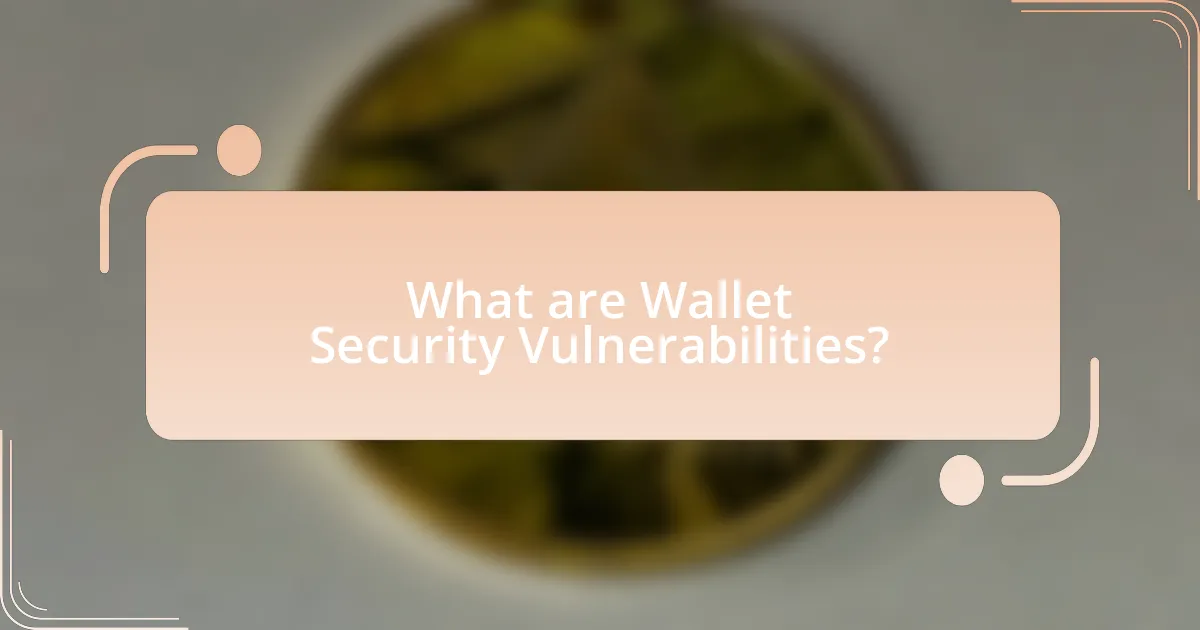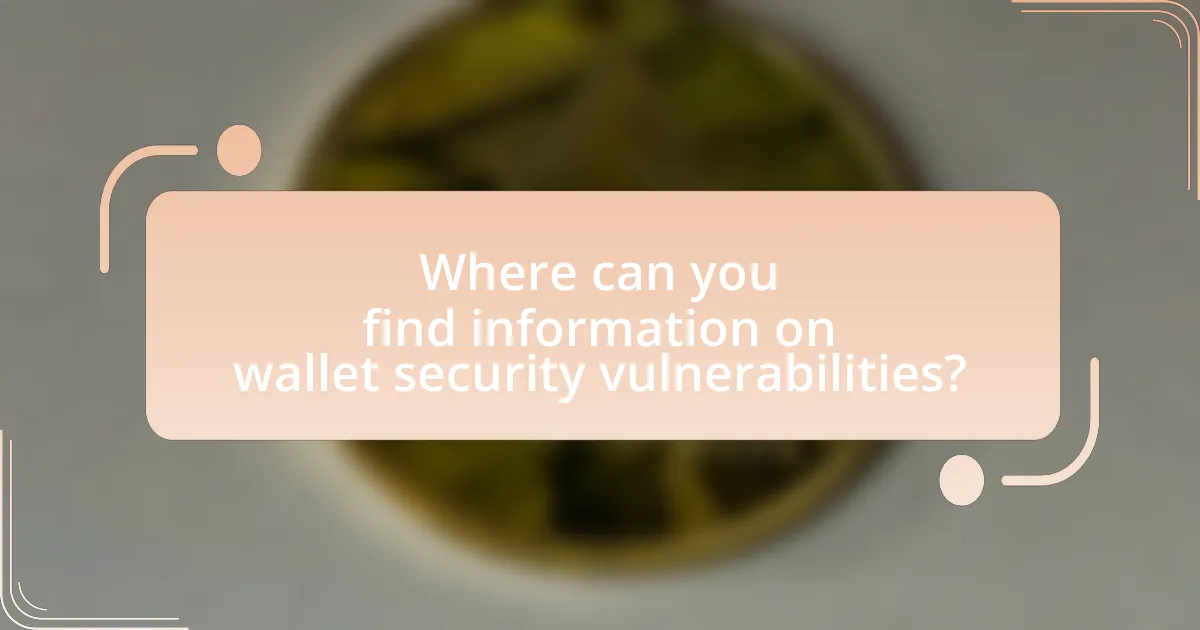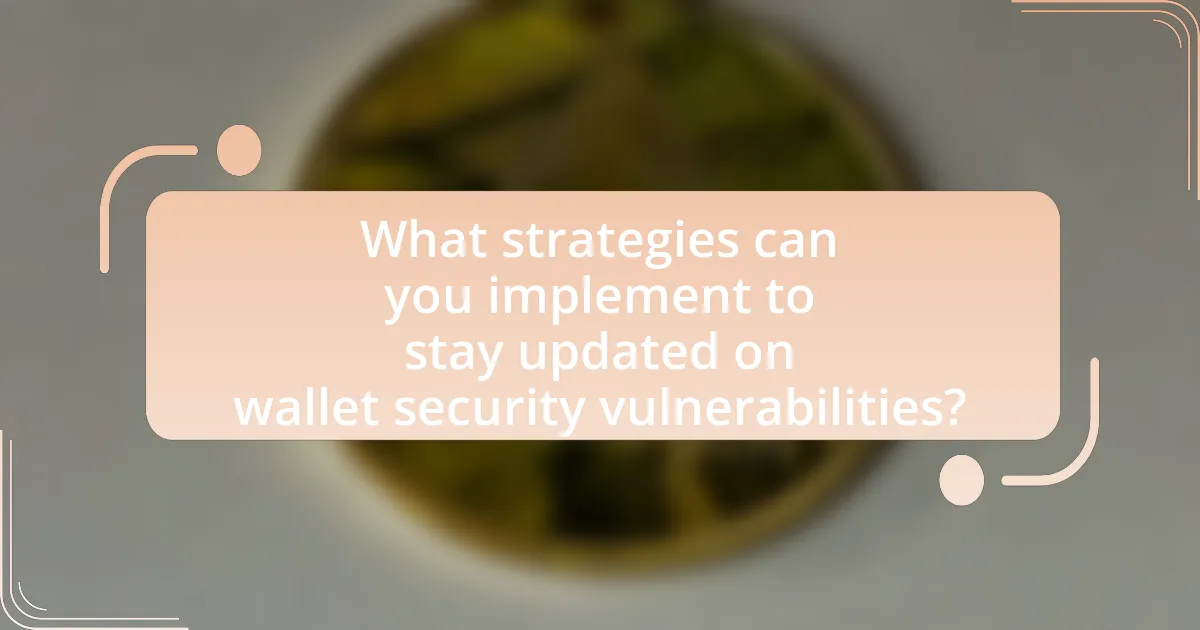Wallet security vulnerabilities refer to weaknesses in digital wallets that can be exploited by attackers, leading to unauthorized access to funds and sensitive information. Common vulnerabilities include inadequate encryption, weak passwords, and user negligence, which can result in significant financial losses. The article outlines how these vulnerabilities arise, the impact of user behaviors on wallet security, and the importance of staying informed about potential threats. It also highlights strategies for monitoring wallet security, including utilizing online resources, community forums, and best practices for maintaining wallet security. By understanding these aspects, users can enhance their protection against cyber threats and safeguard their digital assets.

What are Wallet Security Vulnerabilities?
Wallet security vulnerabilities are weaknesses in digital wallets that can be exploited by attackers to gain unauthorized access to funds or sensitive information. Common vulnerabilities include inadequate encryption, weak passwords, phishing attacks, and software bugs. For instance, a study by the European Union Agency for Cybersecurity (ENISA) highlights that 70% of cryptocurrency wallet hacks are due to poor security practices, such as failing to implement two-factor authentication. These vulnerabilities can lead to significant financial losses for users if not properly addressed.
How do wallet security vulnerabilities arise?
Wallet security vulnerabilities arise primarily from inadequate encryption, poor software design, and user negligence. Inadequate encryption can lead to unauthorized access, as seen in cases where weak algorithms are employed, allowing attackers to exploit the wallet’s data. Poor software design often results in bugs or flaws that can be exploited, such as the infamous Parity wallet hack in 2017, where a vulnerability in the code led to the loss of millions in Ether. User negligence, including the use of weak passwords or failing to enable two-factor authentication, further exacerbates these vulnerabilities, making wallets susceptible to phishing attacks and malware.
What common factors contribute to wallet security vulnerabilities?
Common factors that contribute to wallet security vulnerabilities include weak passwords, lack of two-factor authentication, outdated software, and phishing attacks. Weak passwords can be easily guessed or cracked, making wallets susceptible to unauthorized access. The absence of two-factor authentication increases the risk of account compromise, as it adds an additional layer of security. Outdated software may contain unpatched vulnerabilities that hackers can exploit, while phishing attacks trick users into revealing sensitive information, leading to wallet breaches. According to a report by the Cybersecurity and Infrastructure Security Agency, 90% of successful cyberattacks involve human error, highlighting the importance of user awareness in preventing these vulnerabilities.
How do user behaviors impact wallet security?
User behaviors significantly impact wallet security by influencing the likelihood of security breaches. For instance, weak password practices, such as using easily guessable passwords or reusing passwords across multiple accounts, increase vulnerability to unauthorized access. According to a study by the Cybersecurity & Infrastructure Security Agency, 81% of data breaches are linked to weak or stolen passwords, highlighting the critical role user behavior plays in wallet security. Additionally, users who neglect software updates expose their wallets to known vulnerabilities, as outdated software can be exploited by attackers. Therefore, proactive user behaviors, such as employing strong, unique passwords and regularly updating wallet software, are essential for enhancing wallet security.
Why is it important to stay informed about wallet security vulnerabilities?
Staying informed about wallet security vulnerabilities is crucial to protect digital assets from theft and unauthorized access. Wallets, whether hardware or software, can be targeted by cybercriminals exploiting known vulnerabilities. For instance, in 2021, the cryptocurrency exchange Poly Network suffered a hack that resulted in the loss of over $600 million due to a vulnerability in its smart contract. By keeping updated on these vulnerabilities, users can implement necessary security measures, such as software updates or using more secure wallet options, thereby significantly reducing the risk of financial loss.
What risks do outdated security practices pose?
Outdated security practices pose significant risks, including increased vulnerability to cyberattacks and data breaches. These practices often fail to address current threats, leaving systems exposed to exploitation by malicious actors. For instance, according to a 2021 report by Cybersecurity Ventures, cybercrime is projected to cause damages exceeding $6 trillion annually, largely due to outdated defenses. Additionally, outdated software may lack essential security patches, making it easier for attackers to gain unauthorized access. Therefore, neglecting to update security measures can lead to severe financial losses and reputational damage for organizations.
How can awareness of vulnerabilities enhance user safety?
Awareness of vulnerabilities enhances user safety by enabling individuals to recognize potential threats and take proactive measures to mitigate risks. When users are informed about specific vulnerabilities, such as phishing attacks or software exploits, they can implement security practices like using two-factor authentication and regularly updating their software. Research indicates that informed users are 50% less likely to fall victim to cyberattacks, as they can identify suspicious activities and respond appropriately. This proactive stance significantly reduces the likelihood of data breaches and financial loss, thereby improving overall user safety.

Where can you find information on wallet security vulnerabilities?
Information on wallet security vulnerabilities can be found on cybersecurity websites, blockchain forums, and official wallet provider documentation. Websites such as the Cybersecurity and Infrastructure Security Agency (CISA) and the National Institute of Standards and Technology (NIST) regularly publish reports and guidelines on security vulnerabilities. Additionally, platforms like GitHub host discussions and updates from developers regarding vulnerabilities in specific wallets. Security-focused forums, such as Reddit’s r/CryptoCurrency and specialized blogs, also provide insights and community-driven information on emerging vulnerabilities.
What are the best online resources for wallet security updates?
The best online resources for wallet security updates include the official websites of wallet providers, cybersecurity blogs, and forums dedicated to cryptocurrency. Official websites, such as those of Ledger, Trezor, and MetaMask, regularly publish security advisories and updates. Cybersecurity blogs like Krebs on Security and CoinDesk provide insights into vulnerabilities and best practices. Additionally, forums such as BitcoinTalk and Reddit’s r/CryptoCurrency often discuss recent security issues and solutions, making them valuable for real-time updates. These resources are essential for staying informed about potential vulnerabilities and security measures in the cryptocurrency wallet space.
Which websites provide reliable security news and updates?
Websites that provide reliable security news and updates include Krebs on Security, The Hacker News, and SecurityWeek. Krebs on Security, authored by journalist Brian Krebs, is known for in-depth investigations into cybersecurity incidents and trends. The Hacker News offers timely updates on security vulnerabilities and breaches, making it a go-to resource for professionals. SecurityWeek covers a wide range of cybersecurity topics, including threat intelligence and industry news, ensuring comprehensive coverage of the security landscape. These websites are widely recognized in the cybersecurity community for their accuracy and reliability.
How can social media platforms be used to track wallet security news?
Social media platforms can be used to track wallet security news by following relevant accounts, hashtags, and groups dedicated to cryptocurrency and cybersecurity. These platforms, such as Twitter and Reddit, often serve as real-time information hubs where experts and enthusiasts share updates on vulnerabilities, breaches, and security best practices. For instance, Twitter accounts of cybersecurity firms and cryptocurrency exchanges frequently post alerts about wallet security issues, while Reddit communities discuss recent incidents and solutions. This immediate access to information allows users to stay informed and take proactive measures to protect their wallets.
How can you leverage community forums for wallet security insights?
You can leverage community forums for wallet security insights by actively participating in discussions and monitoring posts related to wallet vulnerabilities. Engaging with experienced users allows you to gather firsthand information about recent threats and effective security practices. For instance, forums like Reddit and specialized cryptocurrency communities often share real-time updates on phishing scams and software vulnerabilities, which can be crucial for maintaining wallet security. Additionally, many users post their experiences with specific wallets, providing valuable insights into their security features and weaknesses. This collective knowledge can help you make informed decisions about wallet usage and enhance your overall security posture.
What are the benefits of participating in security-focused communities?
Participating in security-focused communities offers numerous benefits, including access to real-time information on vulnerabilities and threats. These communities facilitate knowledge sharing among members, enabling individuals to stay informed about the latest security trends, tools, and best practices. For instance, platforms like GitHub and specialized forums often provide updates on emerging vulnerabilities, allowing participants to implement timely security measures. Additionally, engaging with experts in these communities fosters networking opportunities, which can lead to collaborations and mentorship, enhancing one’s skills and understanding of security issues.
How can you identify credible information in forums?
To identify credible information in forums, evaluate the source’s reputation, check for expert contributions, and verify claims with external references. Reputable forums often have moderators or established members who provide accurate information, while expert contributions can indicate reliability. Additionally, cross-referencing claims with trusted sources, such as cybersecurity publications or official announcements, reinforces the credibility of the information presented.

What strategies can you implement to stay updated on wallet security vulnerabilities?
To stay updated on wallet security vulnerabilities, regularly follow reputable cybersecurity news sources and subscribe to security-focused newsletters. These sources often report on the latest vulnerabilities, patches, and security best practices, ensuring you receive timely information. For instance, websites like Krebs on Security and the Cybersecurity & Infrastructure Security Agency (CISA) provide updates on emerging threats and vulnerabilities. Additionally, participating in online forums and communities, such as Reddit’s r/CryptoCurrency or specialized Discord channels, can facilitate discussions about recent vulnerabilities and security measures among peers. Engaging with these platforms allows for real-time sharing of information and experiences related to wallet security.
How can you set up alerts for wallet security news?
To set up alerts for wallet security news, utilize online tools like Google Alerts or RSS feeds from reputable cryptocurrency news websites. Google Alerts allows users to input specific keywords related to wallet security, such as “wallet security breach” or “cryptocurrency wallet vulnerabilities,” and receive email notifications when new content is published. Additionally, subscribing to RSS feeds from trusted sources like CoinDesk or CryptoSlate ensures timely updates on relevant news. This method is effective as it aggregates information from multiple sources, keeping users informed about the latest developments in wallet security.
What tools can help you receive timely updates on vulnerabilities?
Tools that can help you receive timely updates on vulnerabilities include vulnerability management platforms, threat intelligence services, and security news aggregators. Vulnerability management platforms like Qualys and Rapid7 provide real-time alerts on newly discovered vulnerabilities and patches. Threat intelligence services such as Recorded Future and ThreatConnect offer insights into emerging threats and vulnerabilities based on extensive data analysis. Security news aggregators like Feedly and Google Alerts allow users to customize feeds for specific topics, ensuring they receive the latest information on vulnerabilities relevant to their interests. These tools collectively enhance awareness and response capabilities regarding security vulnerabilities.
How can you customize alerts to focus on specific wallets or threats?
You can customize alerts to focus on specific wallets or threats by utilizing alert settings in your wallet management software or security platform. Most platforms allow users to set parameters such as wallet addresses, transaction types, and specific threat indicators to receive tailored notifications. For instance, if a wallet management tool supports API integrations, users can configure alerts based on transaction volume or unusual activity patterns associated with particular wallets. This customization enhances the ability to monitor for potential security breaches or fraudulent activities effectively.
What role do newsletters and blogs play in staying informed?
Newsletters and blogs serve as essential tools for staying informed about wallet security vulnerabilities by providing timely updates and expert insights. These platforms deliver curated content directly to subscribers, ensuring that individuals receive the latest information on emerging threats, security practices, and technological advancements. For instance, cybersecurity blogs often analyze recent breaches and offer actionable advice, while newsletters may summarize key developments in the industry, making it easier for users to understand complex issues. This consistent flow of information helps individuals and organizations proactively manage their security measures and stay ahead of potential risks.
Which newsletters are recommended for wallet security updates?
Recommended newsletters for wallet security updates include “CoinDesk,” which provides timely news on cryptocurrency security, and “The Block,” known for in-depth analysis of blockchain technology and security vulnerabilities. Additionally, “CryptoSlate” offers updates on wallet security incidents and best practices. These newsletters are recognized for their reliability and focus on the latest developments in wallet security, making them valuable resources for staying informed.
How can you evaluate the credibility of blogs covering wallet security?
To evaluate the credibility of blogs covering wallet security, assess the author’s expertise, the quality of sources cited, and the frequency of updates. Authors with relevant qualifications or experience in cybersecurity or blockchain technology are more likely to provide accurate information. Blogs that reference reputable sources, such as academic papers or industry reports, enhance their credibility. Additionally, regularly updated content indicates that the blog is actively monitoring developments in wallet security, which is crucial given the rapidly evolving nature of cybersecurity threats.
What are some best practices for maintaining wallet security?
To maintain wallet security, users should implement strong passwords, enable two-factor authentication, and regularly update their software. Strong passwords should be complex, combining letters, numbers, and symbols, making them difficult to guess. Two-factor authentication adds an extra layer of security by requiring a second form of verification, such as a text message or authentication app, which significantly reduces the risk of unauthorized access. Regular software updates are crucial as they often include security patches that protect against newly discovered vulnerabilities. According to a report by the Cybersecurity & Infrastructure Security Agency, 85% of successful cyberattacks exploit known vulnerabilities that could have been mitigated by timely updates.
How can regular software updates enhance wallet security?
Regular software updates enhance wallet security by patching vulnerabilities that could be exploited by attackers. These updates often include security fixes that address newly discovered threats, thereby reducing the risk of unauthorized access to wallet data. For instance, a report by the Cybersecurity and Infrastructure Security Agency (CISA) indicates that 85% of successful cyberattacks exploit known vulnerabilities for which patches are available. By consistently applying updates, users can significantly lower their exposure to such risks, ensuring that their wallets remain secure against evolving cyber threats.
What security measures should you implement to protect your wallet?
To protect your wallet, implement strong passwords, enable two-factor authentication (2FA), and regularly update your software. Strong passwords should be complex, combining letters, numbers, and symbols, making them difficult to guess. Two-factor authentication adds an extra layer of security by requiring a second form of verification, significantly reducing the risk of unauthorized access. Regular software updates ensure that you have the latest security patches, protecting against known vulnerabilities. According to a study by the Cybersecurity & Infrastructure Security Agency, using 2FA can block 99.9% of automated attacks, highlighting its effectiveness in wallet security.